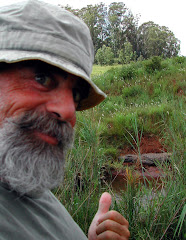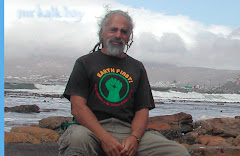4.4.12
BOUND TO OCCUR ---A Little Treatise on the Adolescent Human Culture
BOUND TO OCCUR
A Little Treatise on the Adolescent Human Culture
--aMan Bloom, April, 2012
While we witness in varying degrees of disbelief and despair the devolving on many fronts of both our planet and our world, this brief review and opinion contains no startling information to anyone also observing the flows of energy and of matter on this Earth.
I say both ‘ours’ with some irony attached, since it is the very us provoking the risks and providing the obstacles that combine to threaten most of life and much of system. It is our world that is endangering our planet.
1.
I will maintain that a certain destiny is being fulfilled by this, which gives me anyway some little grounds for hope, at least in the existential sense. Not destiny, I quickly add, that is particular or ordained in any way, but is simply the orderly unfolding of an evolving process in a totally expected manner (were we in our present form to have been ‘then’ to predict it).
Given the current set of beliefs regarding the emergence of life on a rocky planet and that some descendant beings eventually developed a sort of awareness, and a resultant cleverness, including the ability to be creative, to become technological, and to understand at a rudimentary level the workings of matter and the stuff of life, a necessary set of steps must needed encountering.
While acquiring these skills and accomplishing those worthy tasks, differing notions of keeping civil order (peace) and establishing ethical morality (integrity) were also introduced by us to each other.
At first, likely it was simply natural, i.e., genetically sound, to be kind to one’s kin, to respect one’s neighbors and their property, and honor one’s spouse. This is just the way it goes for communal animals that require each other’s efforts for their mutual and individual survival. Animals such as these might recognize each other as generic brothers and sisters, and so abjure from killing and/or eating one another. I will claim that even before any notions of deity entered the scene, acts such as those within a tribe would have been unholy, in that they operated against the sacredness of nature, against the very nature of the beast and of the being who is intent on procreating and surviving.
2.
Later, as we continued on our quests and in our acts, it came upon us that there was more to daily life than simple survival.
Not that we wished or wanted to make living more complex than it already was, but we continually discovered unexpected or unintended features of being, and were intrigued by them. Our minds grew and our horizons expanded. The burden of being gained in breadth and in depth. In the process, new circumstances arose in the universe that weren’t there before: beauty, honor, kindness, for example; also envy, pride, rancor. Though rooted in nature, they are enhanced through mind into forms unknown to nature. Not so much a blossoming; more a transmuting.
Jumping ahead some tens of thousands of years, horizons expanded more quickly for some than for others, and so, the disparities. Some arose out of nature –stronger, smarter, prettier— and then were aggrandized; others came from a vile source, a contra-nature source, in terms of this paper, and those we deal with now.
3.
I’ll maintain that these negating developments were bound to occur and in a very strict sense. They are as attached to the emergence of a conscious and aware set of beings as adolescence is to the individual. One cannot go from infancy to maturity avoiding the adolescent experience. It is when mistakes are made at a depth and level of importance lesser than that if fully-fledged. Yes, upon occasion fields are set afire or someone loses a limb, but on the whole the calamity is reduced in scope by the very nature of youth and its ability to harm.
Problem being, I’ve often asserted that this present example of intelligent life on our planet is in its adolescence, that is, “smart enough to be dangerous.” Our species has been providing evidence for this claim for millennia. (When will we grow up? It’s not that simple.)
On the bright side, or the less dark one, or the gray one, the harm we’ve caused so far, however horrible, has not damaged us, our neighbors or the planet to the point of utter devastation, until now.
The devastation claim has certainly been made before, though often with different reasons. Those who harbor the god-fetish (the majority?) see us at the least being tested, at the most punished for our sins (though not necessarily the unholy ones mentioned here). Also, they do not posit solutions that abide with nature or seek sustainability, and thus claim that this suffering is required (bound?) and that salvation is just a prayer and a heartbeat away…
Other possible causes for devastation are more natural in mode, including geophysical catastrophe, pandemic disease, resource shortage caused by drought or flood or pestilence. Through sheer appetite of numbers and technological stress, we now compete with nature in scope of power.
Question: Can one nurture a species into maturation? Teenagers just grow up naturally, most of them, many of them anyway…
Years ago one of my tasks at a research center was to discuss town/gown relations with the Rotary’s education committee. I realized that most of these men had decided what it was to be a man at age 16, and then hold to that general concept unto the grave. Is this the problem with our species?
4.
Another problem, perhaps connected to the former, is that the present world seems run by criminalistic federations –feudal aristocracies with little regard for the lives or works of others; committed only to their own internal rules, power lust and material prosperity. They represent true aberrations to those holy means of nature. They remain in control at the wheel of our destiny, of ours and of the world, and now, worst of all, of the planet. Of the very fountain of life, of existence and of beauty.
We have been privileged this last year to witness or participate in general uprisings in opposition to this gangsterism, often resulting in the overthrow of despots by ordinary citizens bent on retrieving their freedom and their dignity, even at the possible cost of their individual lives. Many did die in this pursuit, but perhaps fewer than were previously dying on orders of those they opposed. To lesser extent (simply because of the human costs involved), the Occupy forces fought a similar battle.
I see this as a rush toward maturity on their part and of those who support them. Not seeking judgment, retribution or authority; full-fledged, they seek authenticity. Authenticity is what awareness is about.
The world in which we find ourselves is a maze of complicated moves and requirements; confounding enough to keep the masses at labor and/or in dread. This condition is fomented and abetted by those same criminal and proto-criminal elements – financiers, professional politicians, arms and drug dealers, lobbyists, multi-nationals, mafias and other conspirators. Bewildered, one is whirling in dervish circles, looking outside for both solace and reward, afraid, whittled into a splintered selfhood, inauthentic to ridiculous extreme. Entertainment replaces acting in such a circus world.
The three rings, though, are around your neck…and they are heavy.
5.
Sorry, I have no solution for you, for us. Though aware and writing about it, I, too, am tossed within the current tsunami --though not wriggling and writhing about it, yet.
The barriers and obstacles seem insurmountable. We are being accosted on multiple fronts; no place is safe; all governments are corrupt. The planet and its living members and systems, the world and its laws and economics, everything in disarray. Adolescence is upon us!
All this, I will remind you, is bound to occur.
Some intelligent beings on some planets, some other ones, do get past and survive intact; go on to an enlightenment of sorts, I suppose.
Hard to imagine, at this moment, the seven billion of us -- so intent on consuming and surviving, hungry, scared -- to imagine us suddenly (yes, since we are on the edge) lifting ourselves out of the muck and mire of morals and matter and re-finding ourselves, re-funding, re-founding…
Tibetan Buddhists claim, I’ve heard, that if any ten percent of humans reach enlightenment, all humanity becomes enlightened in a mind-frequency rippling effect. Though the Tibetans aren’t in any great shape these days either…
I’m not quite so sure that enlightenment, or at least the one that religionists posit, is at all the better situation for the human psyche to be in, given the other options (beauty, joy and enjoyment, creativity, fun, accomplishment). I say, let some other state, if there be one at all, await my presence. Let’s innovate.
Fortunately, there are those, on our planet, in our world, who are persevering to take advantage of the present despair and confusion, by offering creative alternatives to the general courses that were followed by previous civilizations.
The philosophy and precepts of deep ecology[1] place humans back into the food chain, rather than at its (fictional) end, thus honoring all life equally. Bio-diversity, bio-mimicry, sustainability, all seek to recognize nature at our helm. Resource conservation and alternative energy respect the natural heritage. Redefining morality by taking it back to the hearth and away from organized religions and governments (Is this one happening, or am I only wishing it so?).
If I look too deeply at what is happening in the so-called developed world, its fears and recriminations, its steadfast unwillingness to give way, the no-nothingness that also negates sensibility, the racism and fanatical nationalism, then any reason for optimism, even of a minimal, incremental sort, is quickly dashed. On the other hand, the generations seem to be moving about more quickly, as if in a rush to fulfillment; perhaps the next one will be or become mature. Not full-fledged – we cannot yet hope for that – but mature enough for honesty’s sake.
For the sake of honesty.
This ‘revolution’ in technology, is it a good thing; will it
help or hinder the maturation of our species? Unquestionably, it connects disparate elements, but is a ‘quickening’ what we now need? History doesn’t provide much optimism: most advances eventually lead to some sort of mass destruction, or at least contribute to one.
By the way, when the (allegedly) Communist Soviet Union failed, this didn’t mean that thus Democracy was proved the best or better system, or at least the form from which it had evolved in the United States, in notion of brilliant men who yet fostered free markets and granted suffrage only to their own kind (white, male, propertied), and also held slaves…
We now see democracy touted as an ideal, to be exported to countries that have been governed otherwise. Perhaps it actually is a preferred alternative, were it to work as presented, but we now see that its inequities are increasingly subtle and soon become well-protected. Thus manipulated, its export is a form of colonial and cultural imperialism. It is all too easily subverted by corrupters who have gained control of the economy and the media, hence of the government and even the governed. They both make and break the laws.
1. The Deep Ecology Platform by Arne Naess and George Sessions
The eight-point Deep Ecology Platform at present provides the unifying principles of the deep ecology movement.
1. The well-being and flourishing of human and nonhuman life on Earth have value in themselves (synonyms: inherent worth, intrinsic value, inherent value). These values are independent of the usefulness of the nonhuman world for human purposes.
2. Richness and diversity of life-forms contribute to the realization of these values and are also values in themselves.
3. Humans have no right to reduce this richness and diversity (except to satisfy vital needs).
4. Present human interference with the nonhuman world is excessive, and the situation is rapidly worsening.
5. The flourishing of human life and cultures is compatible with a substantial decrease of the human population. The flourishing of nonhuman life requires such a decrease.
6. Policies must therefore be changed. The changes in policies affect basic economic, technological, and ideological structures. The resulting state of affairs will be deeply different from the present.
7. The ideological change is mainly that of appreciating life quality (dwelling in situations of inherent worth) rather than adhering to an increasingly higher standard of living. There will be a profound awareness of the difference between big and great.
8. Those who subscribe to the foregoing points have an obligation, directly or indirectly, to participate in the attempt to implement the necessary changes.
From: Clearcut: The Tragedy of Industrial Forestry, edited by Bill Devall (San Francisco: Sierra Club Books and Earth Island Press, 1993).
Subscribe to:
Comments (Atom)





